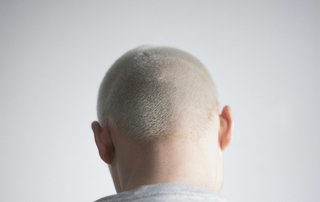We often focus on skincare routines and hair treatments, but how often do you think about your scalp? Just like the skin on your face or body, your scalp needs the right care to stay healthy. Unfortunately, many common habits can cause irritation, dryness or even long-term damage without us even realising it.
In this blog, we’re uncovering the hidden habits that could be harming your scalp and what you can do to protect and restore its health.
What habits are harming your scalp health?
A healthy scalp is clean, hydrated and balanced. However, several everyday actions can disrupt the skin’s delicate environment and make existing problems worse. Below are some of the most common habits that might actually be harming your scalp, plus tips on how to fix the issue.
1. Not washing hair frequently enough
Whilst washing your hair too often can be harmful, under-washing can lead to a buildup of oils, dead skin cells and bacteria on the scalp, which can worsen conditions like dandruff, seborrheic dermatitis and even contribute to hair loss. Signs you may not be washing your hair enough include:
- Persistent scalp itching or irritation
- Visible flakes or buildup
- Scalp odour
- Worsening of existing scalp conditions
What’s the fix? For most people, regular hair washing 4-6 times per week can be beneficial for scalp health. However, if you have an active scalp condition like psoriasis or seborrheic dermatitis, you could try to use a medicated shampoo such as Polytar Scalp Shampoo 1-2 times per week as directed. You can then use a gentle, regular shampoo on other days if needed.
2. Using hot water
Warm water is great for cleansing the scalp and removing product buildup, but using very warm or hot water too regularly can break down vital proteins and natural oils, disrupting the scalp’s protective barrier. Not only is this bad for your scalp’s health, but it can make hair dry, frizzy and strip away hair dye, making the colour fade quicker.
What’s the fix? Stick to lukewarm water when rinsing, and finish with a cool rinse to help seal the hair cuticle and soothe the scalp.
3. Harsh chemicals
Many shampoos, conditioners and styling products contain sulphates, parabens, alcohol and artificial fragrances. These harsh ingredients can strip the scalp’s natural oils, disrupt the skin’s delicate pH balance and trigger inflammation or allergic reactions, particularly in people who have sensitive skin or pre-existing scalp conditions.
What’s the fix? Polytar Scalp Shampoo, a UK-licensed medicated shampoo since 1960, can be used to treat (not just relieve symptoms) of scalp conditions including: dandruff, psoriasis, seborrhoeic dermatitis and eczema.
4. Aggressive shampooing
Scrubbing your scalp too vigorously might feel like you’re giving it a deep clean, but it can actually cause micro-tears in the skin, leading to irritation, flaking and increased sensitivity. Over time, this can weaken the scalp’s barrier, exacerbate inflammation and even contribute to common scalp issues like dandruff, itchiness or hair shedding.
What’s the fix? Switch to a medicated shampoo that suits your scalp’s specific needs. Plus, use your fingertips (not your nails) and apply gentle, circular motions when shampooing to effectively clean without damaging the scalp.
5. Scratching your scalp
If you have dandruff, scalp psoriasis or seborrheic dermatitis, you may find yourself scratching your scalp more frequently than normal to relieve itchiness. However, itching your scalp with long nails, pens or other sharp objects causes several problems:
- It can inflame the scalp and weaken the scalp’s protective barrier
- The scalp becomes more vulnerable to infection
- You may cause painful open wounds and scabs
- You actually make the itch feel much worse
What’s the fix? Avoid scratching if possible (slowly massage any itchy spots with your fingertips using low pressure for gentle relief).
6. Not using Polytar Scalp Shampoo consistently enough
If you’re managing conditions like scalp psoriasis, seborrheic dermatitis or stubborn dandruff, consistency is key. Many people start using a medicated shampoo, see some improvement, then scale back too quickly or forget to keep up the routine. This stop-start approach can lead to flare-ups coming back just when things were starting to improve.
What’s the fix? Depending on your symptoms, the severity of your condition and the frequency of your flare-ups, use Polytar 1-2 times per week for four weeks, or as advised by your healthcare provider. Use for longer than 4 weeks should only be on the advice of a doctor.
Read our blog on how often should you use medicated shampoo for psoriasis or dermatitis for more information.
7. Wearing hats and other headwear for too long
Hats, helmets, bandanas and other headwear are great for protecting the scalp from damaging UV rays, but the combination of heat, sweat and friction creates a warm, moist environment where bacteria, yeast and fungi can thrive. This can lead to conditions like folliculitis, seborrheic dermatitis or general scalp irritation.
What’s the fix? If you regularly wear headwear, choose breathable, moisture-wicking fabrics to try and control excess sweat. Make sure your headwear doesn't fit too tightly, and take it off when you’re out of the sun to give your scalp a chance to breathe. If possible, wash hats and helmet liners regularly to prevent the buildup of sweat, oil and bacteria.
8. Stress and lack of sleep
Chronic stress can disrupt hormonal balance, increase inflammation and worsen scalp conditions like psoriasis or seborrheic dermatitis. It can also trigger telogen effluvium – a form of stress-related hair shedding.
What’s the fix? Incorporate regular stress-relieving activities like exercise, meditation or even a relaxing scalp massage before bed to help you drift off to sleep.
Scalp health is often overlooked, but small everyday habits can have a big impact over time. By being more mindful of how you care for your scalp and using treatments such as Polytar where indicated, you can help keep irritation, dryness and flare-ups under control. A few simple changes can go a long way toward a healthier, more balanced scalp.







